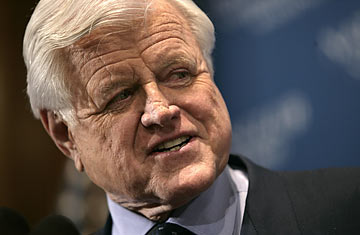
Senator Edward Kennedy, speaking on the U.S.'s involvement in Iraq at the National Press
If the only thing you knew about Ted Kennedy was his national reputation — the liberal lion, the fiercest of partisans — then the results of a poll this past April by the Hill newspaper would have seemed surprising indeed. Asked to name which of their colleagues was the easiest to work with across the aisle, Republicans cited Kennedy as No. 1. That was because of all the strengths that made him probably the most effective U.S. Senator in a century, none was greater than his pragmatism. Ted Kennedy was a man who dreamed big but was always looking for a deal. As his Republican colleague John McCain once said, Kennedy was "the single most effective member of the Senate if you want to get results."
Barack Obama once described Kennedy's gifts to me this way: "I don't think there's anybody who understands the possibilities of government more than Ted Kennedy." It was Jan. 28, 2008, and I was backstage with both men at the rally where Kennedy bestowed his endorsement — and the family blessing — on a presidential candidate who, to many, invoked a spirit that was last seen when JFK ran for the office in 1960. But Ted, in typical fashion, was also thinking in practical terms. When I asked whether his goal was to get Obama elected or whether he was thinking ahead to after that, Kennedy told me, "Afterward. I came to the Senate to get things done. We've been able to achieve a number of important achievements, and I want to continue that. My interest is in getting things done, and I think he has the ability to bring people together."
That kind of thinking explains why there is not a major piece of social legislation from most of our lifetimes that does not bear Ted Kennedy's stamp: civil rights, education, immigration, workers' rights, health care. Often, that change came incrementally. When his dream of universal health care ran aground with the Clinton effort in 1994, he went right back to work trying to get there in small steps, by covering children, for instance, and by trying to limit the ability of insurance companies to deny coverage to people with pre-existing conditions. And more often than not — especially given that half of the 10 Presidents under whom he served were Republicans — he had to turn to the other party to find the votes he needed and the support that would assure a signature into law. "The only way we've ever made progress is when we've had bipartisanship," he said.
What's more, Republicans knew they could trust him, sometimes even to the point that Kennedy exasperated his liberal allies. "I've learned a lot from [Kennedy], and I think he's the consummate legislator," said Margaret Spelling, the Bush White House official with whom he worked on the No Child Left Behind Act. "He is a person of his word."
He knew the importance of trust because he had been in the Senate longer than all but two others in history. And during his formative years in the institution, it was a very different place from the partisan crucible it is today. Kennedy gave what he called his "maiden speech" in the Senate Chamber in 1964, saying the Civil Rights Act — which had gone down 11 times to filibusters by Southern Democrats — should be passed as a tribute to his slain brother. But what got the bill done was not sentiment or oratory; it was a backroom alliance by Republican Everett Dirksen and Democrat Hubert Humphrey to muster the 27 GOP votes it took to avert yet another filibuster. As Kennedy recalled in 2004, on the 40th anniversary of the act, "The Senate came together, across party lines, to live up to America's best ideals."
That happens less frequently these days. And with the loss of Ted Kennedy, it remains to be seen whether it will still be possible for it to happen at all.
